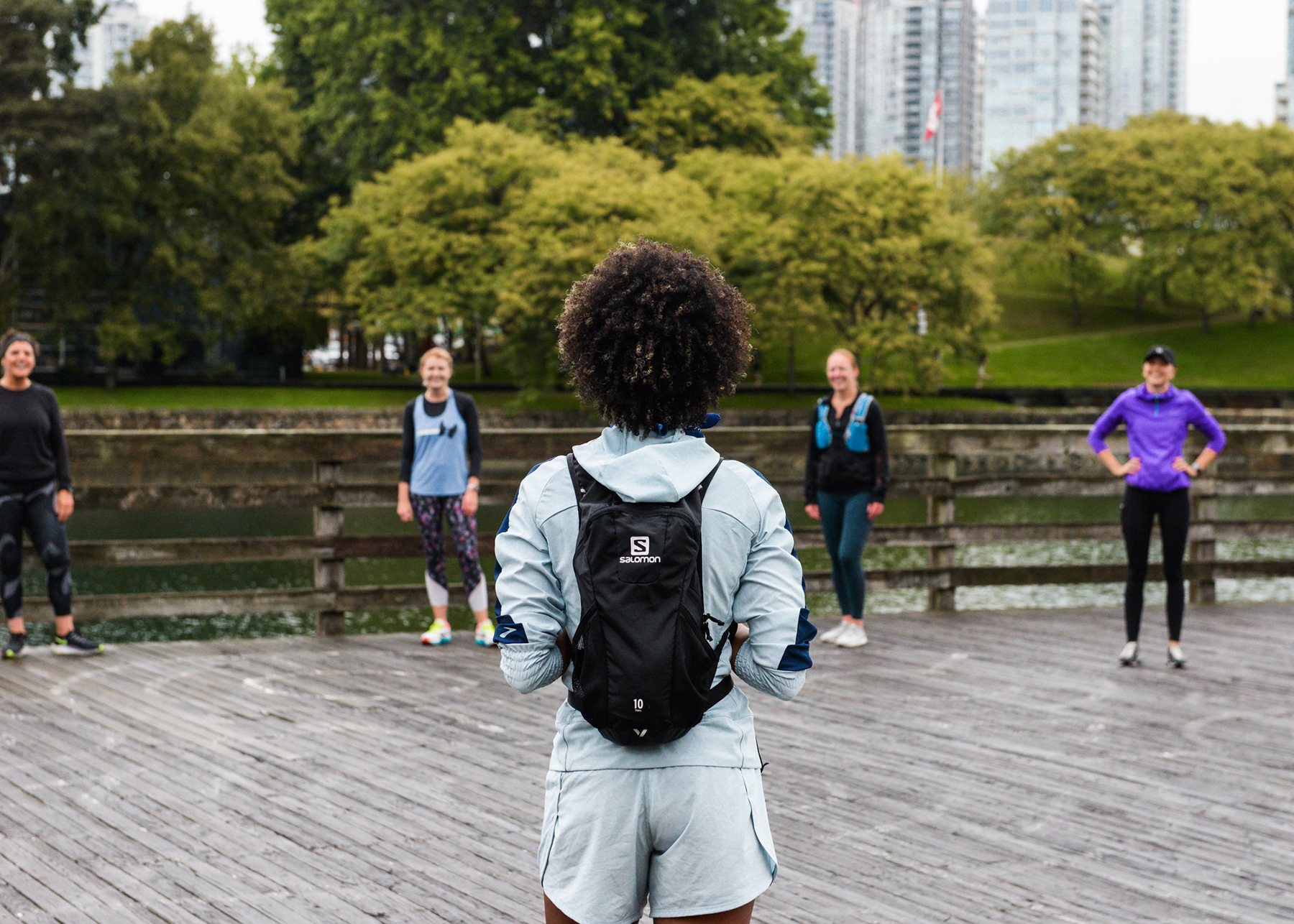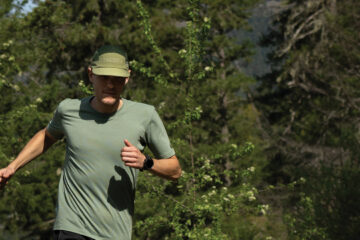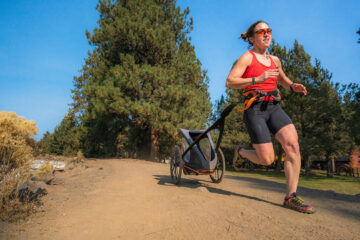this is a story about filsan abdiaman, her fallible self-love journey, and her inclusive mission to share it––project love run.
story by: meggie sullivan with quotes from filsan abdiaman
photos by: van run co & patrick leung
In a world that desperately needs more empathy, allyship, and love, there will always be space to welcome Filsan Abdiaman. Filsan is a certified coach, an ultra runner, a leader, and founder of Project Love Run (PLR). First started in Toronto in 2016, Project Love Run is a running community that invites women to discuss and explore matters of the heart through running, communal eating, and storytelling.
Filsan Abdiamen was born in Somalia and raised Muslim with her two brothers and sister. She spent the greater part of her young life in Kenya, quickly learning Swahili, while her parents preserved and shared many Somali customs. At the age of 18, Filsan left for Canada with her sister to pursue a new education at their parent’s behest. The two grew closer than ever as they navigated teenagehood, high school, a brand new culture, and as she humorously recalls, the public transportation system. Today, Filsan identifies as a Somali-Kenyan-Canadian Muslim Womxn. (The term ‘womxn’––an alternative spelling of ‘woman’––is deployed often by intersectional feminists and Project Love Run to eradicate perceived sexism in its linguistic dependence on ‘man’ and to explicitely include transgender and nonbinary people.)
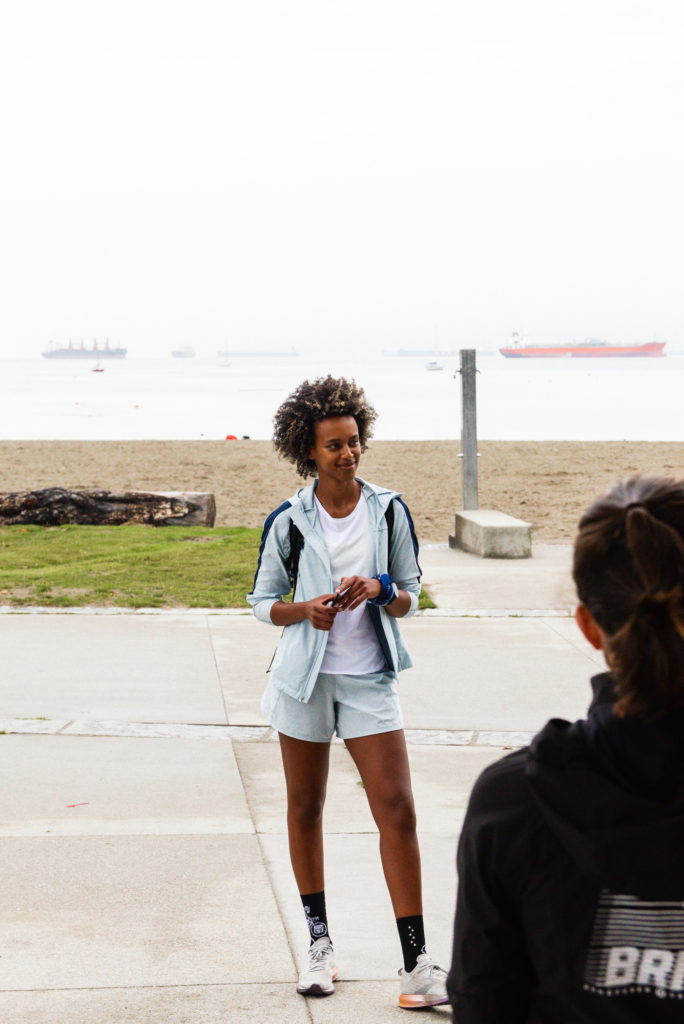
Throughout her childhood, Filsan had never thought of herself as an athlete and was content indoors doing “nerdy journaling,” a practice she continues to this day. It wasn’t until her mid-twenties that Filsan discovered running to cope with a breakup. It became a reliant escape from her reality; a newfangled awareness of her body and emotions. For the first time she could rein in the ever-elusive present moment.
Despite discovering this outlet, Filsan found herself in a tiresome cycle of online dating and swiping. That Halloween, as an “act of rebellion,” Filsan set out in costume as a ‘runaway bride.’ Turning the pop-culture construct on its head, she wanted to reclaim love and run towards self-love. The night was an inflection point in Filsan’s personal self-love journey, one she describes today as ongoing and ever-changing.
Wanting to share her newly found catharsis with her immediate community, Filsan launched Project Love Run’s first chapter in Toronto. “Running helped me find self-love and I wanted it to do the same for other women,” she recounts in PLR’s blog.
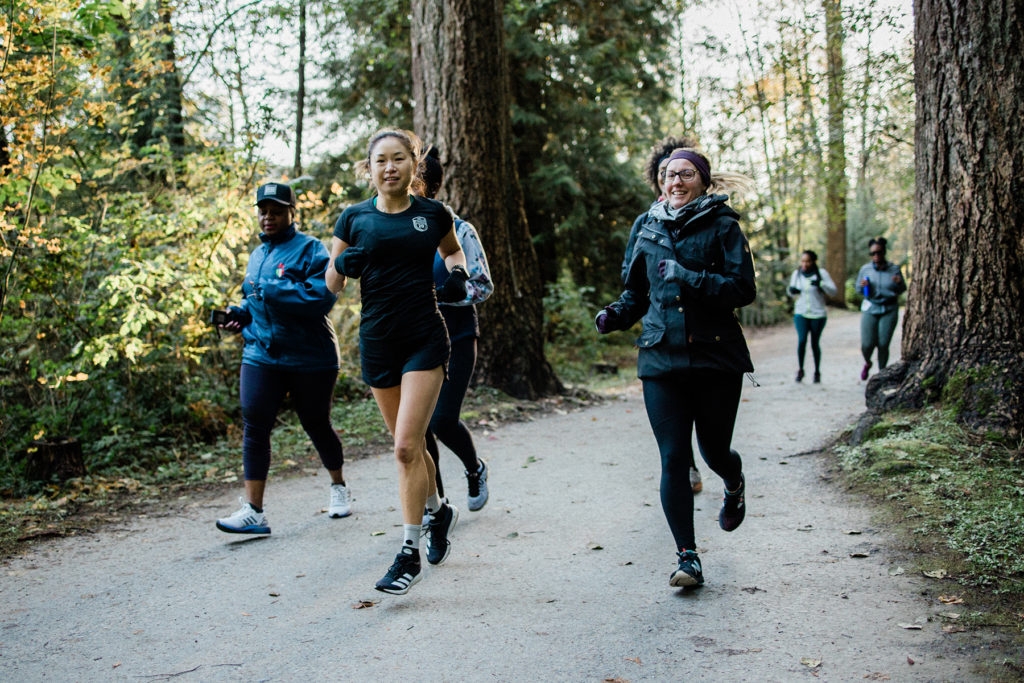
No self-love journey is perfect. Filsan was battling her own demons at the onset of her founding initiative. Even though she was conquering ultramarathons and training, she was confused by her learnt ideas of ‘fitness and health.’ The high-mileage training left her nutritionally depleted. She often wondered if she was eating too little. Or, perhaps too much. Filsan became lost in the cyclical struggle of an eating disorder.
“I would binge to make up for what I lost, and then I would purge. As a Black woman seeing only news articles of white women dealing with eating disorders, I didn’t feel like I had an eating disorder. Later on in my journey with it, I would come to realize I was wrong.“
Filsan was desperate to start anew. By August 2017, she moved to Vancouver for better proximity to nature, trails, and more ultra-races. But she was without her familiar social circles and desperately needed connection. With her anxiety mounting, Filsan’s eating disorder spiraled. “I was at an all-time low.”
“I thought, ‘I have to do something about this.’ I can continue going down this one route or I can try something different. I went for a run and afterward, I stopped at the bookstore and picked up some of Rupi Kaur’s writing. It was a subconscious act. I knew [Kaur’s] poetry and words were going to help me pull through.“
“I am loving myself out of the dark,” wrote Rupi Kaur, an Indian-born Canadian poet in her latest book, entitled home body. Filsan was determined to do the same.
She sought a professional therapist who suggested writing journal entries to herself. “Instead, I decided to write entries full of love to myself. My goal was to write 100 of them, then train and complete the 100-kilometer [Diez Vista] race. As I wrote, I started to celebrate myself, to be kind to myself, to do all the things I was actually writing.”
In one entry Filsan wrote:
Body Love,
I spent some quality time with you this morning;
I washed away the sweat and dirt
Laying bare in this nakedness
Loving all my marks, bruises and flesh
Scanning this body,
You,
For hidden tales I’ve missed
Searching for intimacy behind
Skin rolls and skin folds,
Looking in
And entering deeper within
My soul
Feeling you body,
Holding you –
Loving every single bit of
You
By kismet, Filsan would reach her goal of 100 entries on Valentine’s Day. And, the 100-kilometer race was one she’d never forget. It’s where she met her current partner. “It goes to show, when you focus and place your love onto yourself…people see it.”
Shortly thereafter by summertime, Filsan launched Project Love Run’s Vancouver chapter.
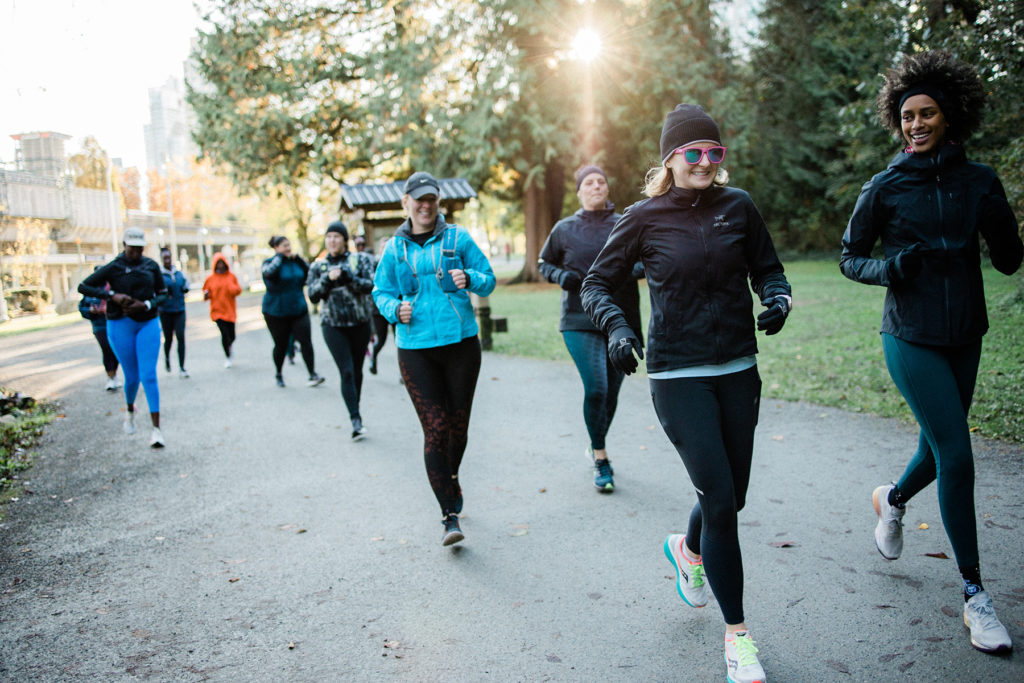
Today, Project Love Run can be found across Canada in Edmonton, Calgary, Montreal, Toronto, and Vancouver. PLR’s women are a spectrum of identities and experiences: racial backgrounds, ethnicities, genders, sexualities, bodily types, and running abilities. “With my collective, I often say: Only your love is welcome here.” Every run has a theme and begins with attendees stating their identifiable pronouns ––she/her, they/them––and the encouragement to quietly identify how they “take up and show up in space” and a reminder to “respect and honour the space of those around them.”
This habitual practice lays a basic foundation for self-awareness before they dive into any dialogue. Filsan believes that identity is synonymous with one’s experience, and ultimately a story to be shared, related to, or inspired by.
Project Love Run’s conversations deeply explore themes of womanhood, especially for BIPOC women.
“We must acknowledge our stories in order to be seen and to feel heard. This is who we are. Our stories must become the mainstream so others can see how they belong.“
Recent topics for runs and on PLR’s blog have included BIPOC women in business, cultivating friendships where diversity is lacking, masturbation as self-care, and menopause, to name a few.
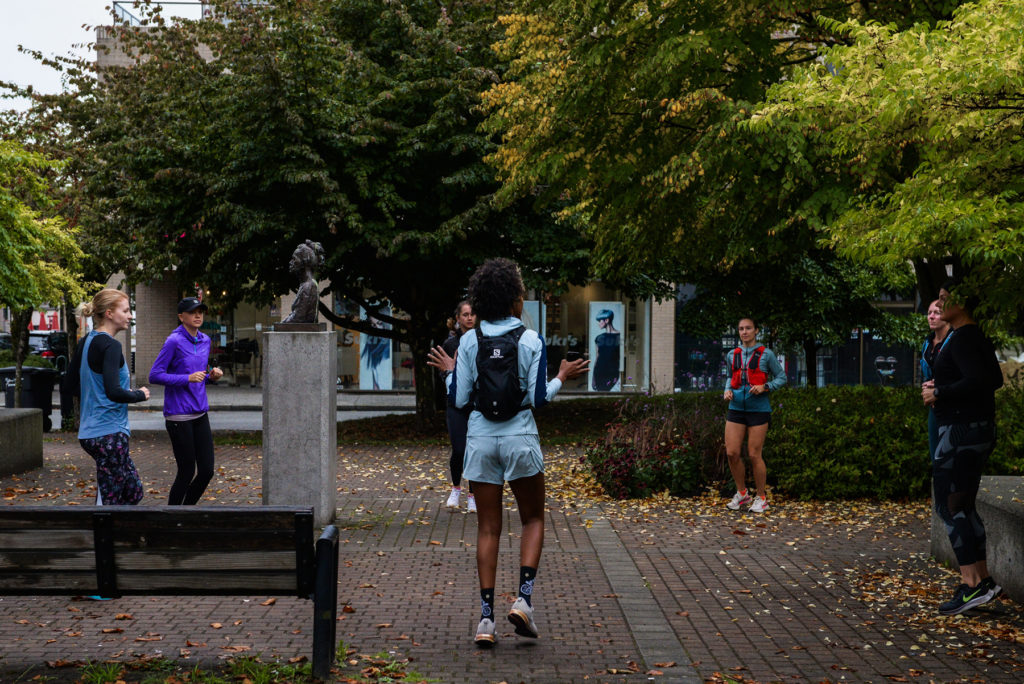
Project Love Run has opened doors for many of its women in ways that didn’t previously exist for them. “There are many Black women and women of color, who have shared with me that they were connecting on another level, that they felt seen, that they could belong.” Filsan recalls a time when she felt this too. When she first arrived in Vancouver, run crews would often use the statement ‘running for everyone.’ She found this problematic as the city is predominantly white and of Asian descent.
“There are folks in the running world who are unaware. These are the white running spaces. It might not be your intention to be in one of them, but that’s where the community is situated. I’m a Muslim woman, I’m Black, I’m female. I don’t wear a hijab. I don’t talk about my partner. Sometimes I drink. I have felt apprehension not only being here but I fear judgement within the Muslim community. We have to work towards creating a space that is for everyone.“
What can one do better to not only welcome marginalized individuals, like Filsan, but to embrace and support them?
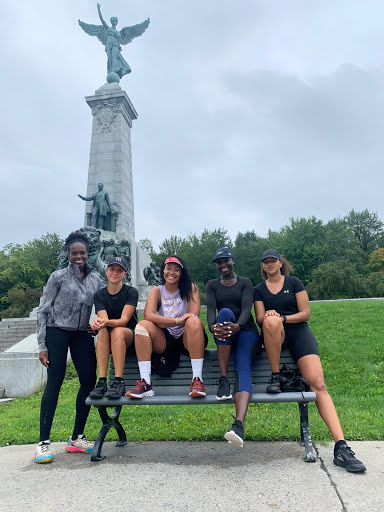
Take notes. Project Love Run practices introspection and reflection together. They also know their values and share them outwardly.
“It’s not enough to say running is just running in its simplest form. Running crews really need to realize and say, ‘These are our values. This is who we are.’ Answering this so that people know what you’re about is very important in the world we live in.
Some people don’t think running is political, but when you have all these identities, running does impact you and influence you. Running is so many things.“
If there’s one thing 2020 has done effectively, it has put a mirror up to society’s and one’s own beliefs, asking its viewer to respond. Whether you are a lone recreational/professional runner, a part of a crew, a club, or a team, Project Love Run inspires the question: How does your running practice offer self-love? How does it reach beyond ‘you?’ To your community, to running’s mainstream?
In order to achieve diversity, inclusion, belonging, equity, and ultimately advance the sport, Filsan advises that one must check themselves and their internal biases first before making changes beyond. For example, asking the question ‘why do I feel uncomfortable about this space not being inclusive?’
“You have to do things like supporting grassroots movements and creating space for BIPOC folks, their bodies, and their experiences. Invite them in to understand what their struggles are. Pinpoint the blind spots. Identify the next steps.” To those who heed this advice, Filsan warns, “you cannot tokenize them. You must involve them in the ground work.”
Acknowledgement is key. The approach must start at the foundation. The status quo and complacency are no longer acceptable. The frontier is vast and guiding voices like Filsan’s must continue to be amplified.
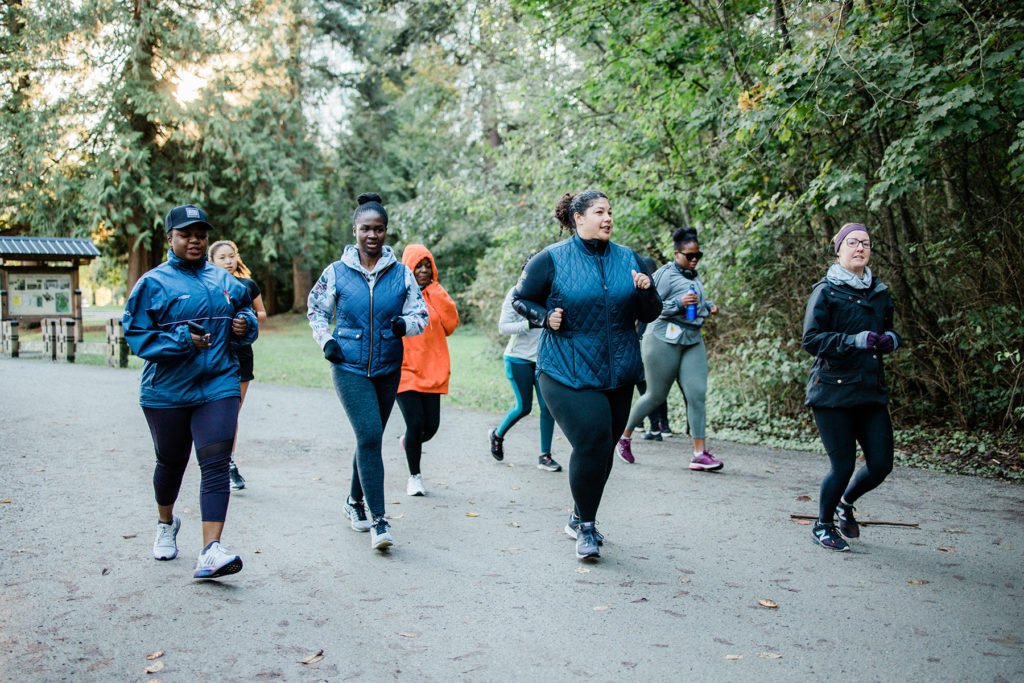
Running plays an enduring role in Filsan’s evolution of self-love and mission for others. When she’s bounding along the verdant trails of British Columbia, Filsan describes the experience as knowing her place in the world.
“I’m surrounded by nature’s beauty and feel very small in this very big universe. I know there is something much greater. I feel close to God. This feeling of love and being loved is a clear indication of God’s presence. I have real ownership over my space, even though I am completely alone. This is enough for me.“
It is one thing to run alone. But it is not enough to trailblaze alone. Knowing Filsan’s story, perhaps now you will choose to run beside her.
follow Filsan’s and Project Love Run’s latest here:
Project Love Run’s upcoming monthly virtual runs due to the current COVID-19 pandemic.
Project Love Run’s blog.
Filsan on Instagram.
Project Love Run on Instagram.


